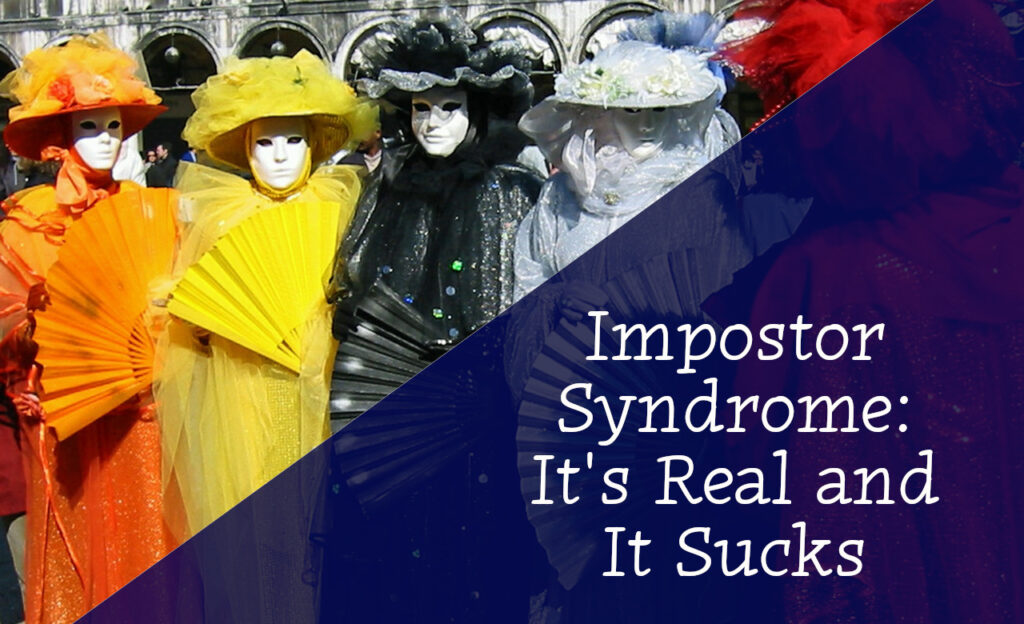I have been thinking about writing a post about impostor syndrome for a couple of months and actively trying to write it for a couple of weeks. There is a good chance my brain has been replaced by poorly made jello that is now ineffectively sloshing around my skull. Though, poorly made jello probably sloshes quite effectively, so… It is moments (and weeks, and months) like these that make me question my ability to write; that make me wonder if I am in fact an impostor.

I don’t write consistently. Often, I don’t write very well. I haven’t really published anything (and no I don’t count my own blog posts as stuff I’ve published). I have finished a couple of things, but they’re either not worth mentioning or they never made it beyond the millionth draft stage. So, can I really call myself a writer?
Lots of us face this question. Lots of us face it multiple times, because this question (much like an impostor) changes its approach to suit the situation. It creeps up out of nowhere and snatches that untended confidence right out of your pocket.
What is Impostor Syndrome?
When all evidence points to you being a writer, but you don’t believe you’ve “earned” the title: that’s impostor syndrome. It’s the feeling that when you tell people you are a writer (or editor, or artist, or any number of things) that you’ve told a lie; that you’re simply pretending to be something you wish to one day be.
The Manifestation of Impostor Syndrome
Impostor syndrome is a great big jerk that undermines the things you’ve worked towards. And, as I mentioned before, it manifests itself in different ways. It skulks in the shadows, or blends, chameleon-like, in the background waiting for its moment.
When someone asks what you’ve been up to recently, impostor syndrome is there to turn your bold declaration of “I’ve been writing a novel” into a pitiful half shrug and a mumbled “nothing much”. Impostor syndrome rears its head when you finish the first draft (or hit a milestone) but you find yourself unable to celebrate that achievement. It whispers negativity at you, making you believe your writing isn’t very good and therefore not worth pursuing.
These are just a few ways impostor syndrome makes its presence known. I’m sure there are many more, but right now, in this moment of writing, I can’t hear past the whispers.
How Do I Get the Heck Over It?
Getting over impostor syndrome is no easy feat. It’s a cunning opponent, and at the end of the day it boils down to a fight against ourselves, against our perceptions of what qualifies us to say “I am a writer” (or whatever other thing you’re agonizing over being).
If this is a fight against ourselves, why are we bringing others into it? Pay less attention to what other people say and do (obviously that doesn’t include me. My advice is as solid as that jello we spoke about earlier). Who cares that Little Miss Productivity writes five thousand words every twenty minutes, or that Mr I Wrote This Using Only My Pinky Fingers has seven agents fighting to the death to publish his debut novel. Who cares that Mx Perfect Example Of A Functional Human Being writes and publishes three books a year while raising a family and not even breaking a sweat. Maybe all of that is true for those people, but none of them are you. And there is a good chance those people just aren’t talking about the rough days (or weeks, or months).
The thing is, you are here, reading this blog post. You have taken an interest in learning about writing or editing. And I’m willing to bet you have written something. In my book, this makes you a writer.
You may well have been an impostor, but honestly, who cares? We have all been impostors at some point. Trying new things is how we learn. Practice is the only way to hone our craft. None of us will ever be done learning it. So whether you lock yourself in a stall and scribble poems on toilet paper before flushing them, or you have a thousand notebooks full of novels written in a secret language you made up to ensure no one could ever steal your ideas, you are a writer. At some point you shift from trying something new to doing what you love. Acknowledge that moment for what it is: it’s the moment you became a writer, and I bet it happened a whole lot earlier in your life than you imagine.

Thank you Genevieve, words have power, especially ‘inner words’. You _are_ a writer.
End of sentence. It is that simple.
Yes, it is that simple. But for something so simple, it can be surprisingly difficult to internalize.
“Impostor syndrome is a great big jerk ” – YES!
I love this – it helps me to remember the critical voice in my head is a bully. I can imagine turning towards that voice, hands on my hips, and saying firmly, “HEY! Don’t talk to my friend like that!”
Thanks for this and BTW you are definitely a writer! 🙂
Absolutely! If it’s something we would defend our friend from then it’s definitely something we should stand up to for ourselves as well.